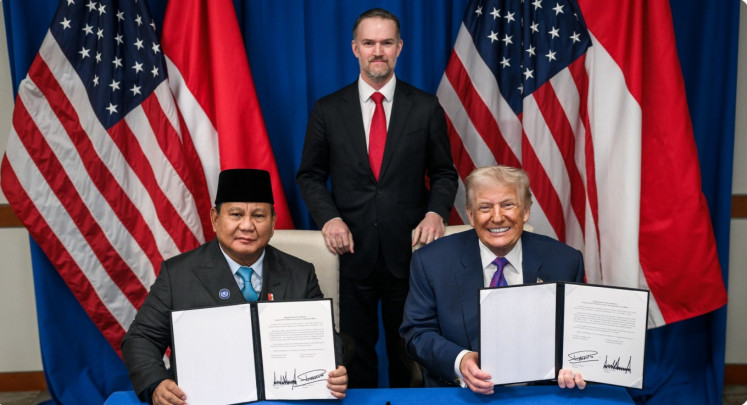Popular Reads
Top Results
Can't find what you're looking for?
View all search resultsPopular Reads
Top Results
Can't find what you're looking for?
View all search resultsThe future of Indonesia's digital-tax regime after G20 Summit
E-commerce taxation should be governed by a separate law, given its nature as a regular fiscal instrument rather than an emergency-financial response to the precarious situation.
Change text size
Gift Premium Articles
to Anyone
The clamor of Indonesia's Group of 20 presidency finally concluded on Nov.16 with the announcement of the 52-paragraph Bali Leaders' Declaration. Despite the turbulence caused by the pandemic, the sluggish economy and the raging war, Indonesia's presidency should be commended for its concerted efforts to accelerate the global recovery.
But what effects does this have on Indonesia as a nation, especially when it comes to one of the most-important agendas: the international-tax package?
The international-tax agenda is outlined in paragraph 31 of the Bali Declaration, which squeezes eight statements covering the commitment, progress and finalization of the two-pillar solution, the international tax-transparency standards, the crypto-asset reporting framework and the exchange of information. As expected, the issues of Pillars One and Two still energized the international-tax discussions within the G20 forum, given their urgency to the current tax environment.
Pillar One, which embodies the new frameworks of global-tax allocation and certainty, and Pillar Two, which presents the global-minimum tax rules, are parts of a long and ongoing project undertaken by the Organisation for Economic Co-operation and Development (OECD) and the Inclusive Framework to address the challenges raised by the digitalization of the economy, as mandated by the G20.
In October 2021, the blueprints for the two pillars were consensually approved by 136 jurisdictions, with a timeframe set for multilateral signings in mid-2022 and enforcement in 2023 for Pillar One. But this target was missed, resulting in a call for an extension until 2024, which was welcomed by the G20 as stated in their Bali declaration.
While the overall design of Pillar Two has been concluded, attracting several countries to early-adopt it unilaterally (e.g., France, Germany, Italy, the Netherlands and Spain), the development of Pillar One appears to have fallen behind, inciting concerns about the emergence of unilateral digital-services taxes around the world. Because this will worsen the global effect of the digitalized economy on taxation due to the absence of an international standard and inapplicability of the current OECD model-tax treaties in resolving the double-tax issues resulting from the unilateral application of such taxes. Hence, the significance of Paragraph 31 of the Bali Declaration in urging each nation to refrain, including Indonesia itself.


















